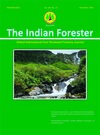Morphological Variations among Different Accessions of Jatropha curcas L.
DOI:
https://doi.org/10.36808/if/2016/v142i11/72923Keywords:
Morphological Parameters, Accessions and Jatropha curcas L., Correlation Matrix.Abstract
Fifteen (15) accessions of Jatropha curcas viz., NAUJ-6, NAUJ-7, SKNJ-7, SKNJ-11, TFRI-1, TFRI-2, PKVJ-HW-1, PKVJ-SJ-1, MPC-CH-B, MPC-UD-J, MPC-UD-K, PANT-J-SEL-1, PANT-J-SEL-2, PAUJ-1 and CCSH-1 were assessed. The different morphological parameters were significantly influenced by different accessions under study during the two years and also in pooled analysis. The traits like plant height, number of branches per plant, number of inflorescence per plant, number of fruits per plant and seed yield per plant were noted observed significantly maximum in the accession MPC-CH-B; collar diameter in the accession PAUJ-1; leaf area in the accession PANT-J-SEL-2; angle of branching in the accession TFRI-2 and 100 seed weight in the accession TFRI-1. Whereas, earlier flowering was noted in the accessions MPC-UD-J. Seed oil content varied from 24.307 to 33.326 %. It was significantly higher in accession TFRI-1 while it was minimum in accession CCSH-1. Correlation matrix of seed yield with various morphological parameters indicated that seed yield was significantly and positively correlated with number of inflorescence per plant, number of fruits per plant, plant height, 100 seed weight and number of branches per plant.References
Bagchi S.K. (1999). Seed-source variation in Acacia nilotica: genetic divergence in 8-month old seedlings. Annals of Forestry, 7 (1): 45-55.
Dehgan B. and Webster G.L. (1979). Morphology and infrageneric relationships of the genus Jatropha (Euphorbiaceae). University of Califoria Publications in Botany, Vol. 74.
Dubey K., Tiwari A. and Singh V.K. (2006). Studies on relative growth performance of Jatropha (Jatropha curcas) provenances at nursery stage. Proc. of National Symposium on Tree improvement for Sustainable Forestry, 4-6 November, Department of Forestry, Jawaharlal Nehru Krishi Viswavidyalaya, Jabalpur, p.11.
Ginwal H.S., Rawat P.S. and Srivastava R.L. (2004). Seed source variation in growth performance and oil yield of Jatropha curcas Linn. in central India. Silvae Genetica, 53 (4): 186 - 191.
Heller J. (1996). Physic nut Jatropha curcas L. Promoting the conservation and use of under utilized and neglected crops. Institute of Plant Genetics and Crop Plant Research, Gatersleben/ International Plant Genetic Resources Institute Rome. pp. 26-53.
Jamaludheen V., Gopikumar K. and Sudhakara K. (1995). Variability studies in Lagerstroemia (Lagerstroemia speciosa pers.). Indian Forester, 121 (2): 137 - 141.
Joshi R.C. (2005). Bio-diesel - Alternative source. Employment News, XXX(17): 1 - 48.
Kaushik N., Sumit R. and Biswas G.C. (2006). Screening of Indian germplasm of Jatropha curcas for selection of high oil yielding plants. Indian J. Agroforestry, 8 (2): 54-57.
Kumar R.V., Tripathi Y.K., Yadav V.P., Singh R., Ahlawat S.P. and Dar S.H. (2006b). Evaluation of genetic divergence in accessions of Jatropha curcas L. Proc. of Notational Seminar on Recent Advances in Forest Sciences, January 30-31, Gurughasidas University, Bilaspur, (Chhatisgarh). pp. 163.
Kumar R., Gupta H.K. and Chauhan K.C. (2006a). Estimation of genetic and environment variability for seedling traits in Pinus roxburghii sergent. Indian J. Forestry, 29 (2): 125 - 128.
Panse V.G. and Sukhatme P.V. (1967). Statistical Methods for Agricultural Workers, I.C.A.R., New Delhi.
Pathak N.N. (1998). Field evaluation and selection of Acacia nilotica provenances. J. Trop. For., 14 (IV): 197 - 203.
Raebild A., Graudal L. and Khan S.R. (2003). Evaluation of a Prosopis provenance trial at Dager Kotli, Pakistan. Danida Forest Seed Centre. Results and Documentation No. 28: 1 - 34.
Ravindrababu Y., Patel M.V., Joshi V.C., Desai K.J. and Patel B.M. (2006). Evaluation of seed characteristics in Jatropha curcas L. J. Oilseeds Res., 23 (2): 318-319.
Shivkumar P. and Banerjee A.C. (1986). Provenance trails of Acacia nilotica. J. Tree Science, 5 (1): 53-56.
Downloads
Downloads
Additional Files
Published
How to Cite
Issue
Section
License
Unless otherwise stated, copyright or similar rights in all materials presented on the site, including graphical images, are owned by Indian Forester.





